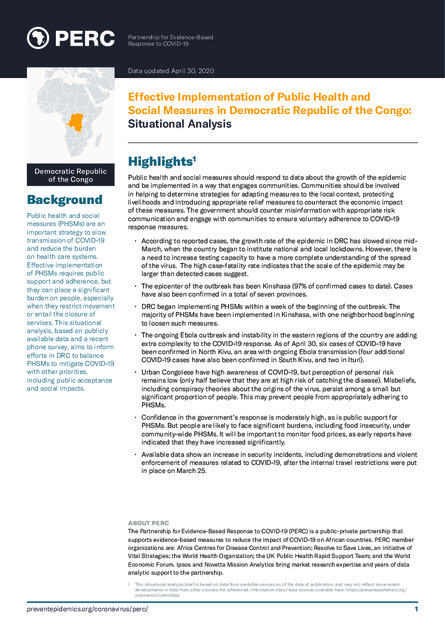
Public health and social measures should respond to data about the growth of the epidemic and be implemented in a way that engages communities. Communities should be involved in helping to determine strategies for adapting measures to the local context, protecting livelihoods and introducing appropriate relief measures to counteract the economic impact of these measures. The government should counter misinformation with appropriate risk communication and engage with communities to ensure voluntary adherence to COVID-19 response measures.
• According to reported cases, the growth rate of the epidemic in DRC has slowed since midMarch, when the country began to institute national and local lockdowns. However, there is a need to increase testing capacity to have a more complete understanding of the spread of the virus. The high case-fatality rate indicates that the scale of the epidemic may be larger than detected cases suggest. • The epicenter of the outbreak has been Kinshasa (97% of confirmed cases to date). Cases have also been confirmed in a total of seven provinces. • DRC began implementing PHSMs within a week of the beginning of the outbreak. The majority of PHSMs have been implemented in Kinshasa, with one neighborhood beginning to loosen such measures. • The ongoing Ebola outbreak and instability in the eastern regions of the country are adding extra complexity to the COVID-19 response. As of April 30, six cases of COVID-19 have been confirmed in North Kivu, an area with ongoing Ebola transmission (four additional COVID-19 cases have also been confirmed in South Kivu, and two in Ituri). • Urban Congolese have high awareness of COVID-19, but perception of personal risk remains low (only half believe that they are at high risk of catching the disease). Misbeliefs, including conspiracy theories about the origins of the virus, persist among a small but significant proportion of people. This may prevent people from appropriately adhering to PHSMs. • Confidence in the government’s response is moderately high, as is public support for PHSMs. But people are likely to face significant burdens, including food insecurity, under community-wide PHSMs. It will be important to monitor food prices, as early reports have indicated that they have increased significantly. • Available data show an increase in security incidents, including demonstrations and violent enforcement of measures related to COVID-19, after the internal travel restrictions were put in place on March 25.
